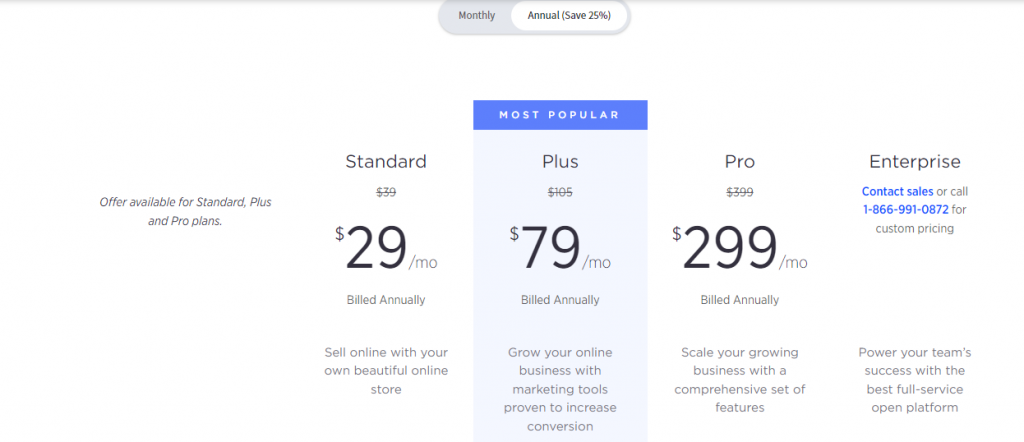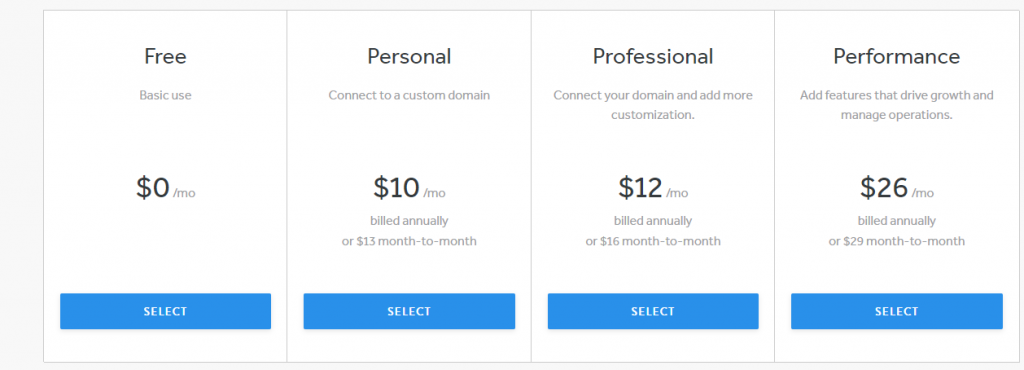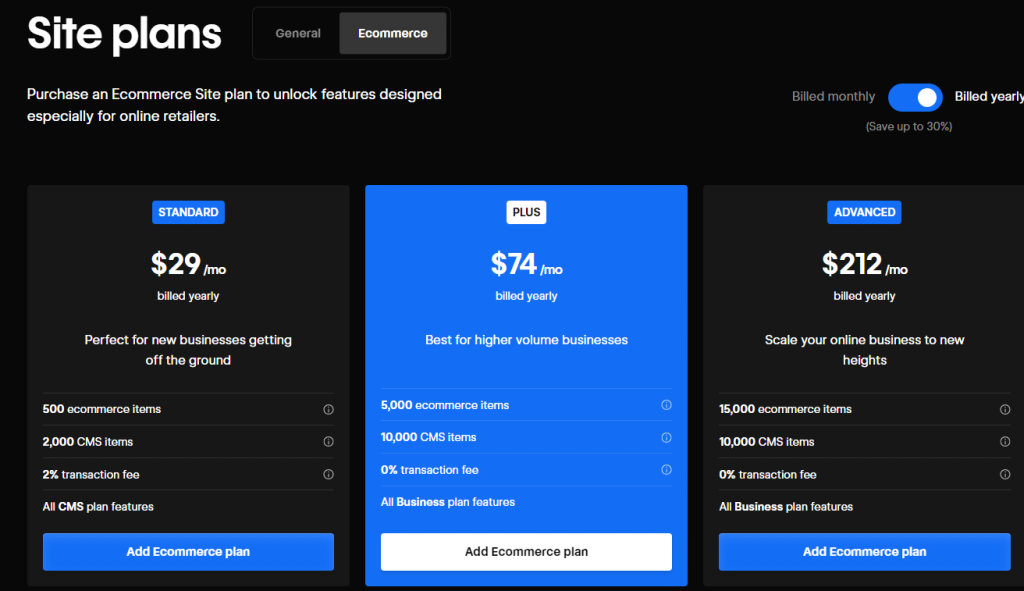This guide provides a comparison of the leading 8 Best Ecommerce Platforms designed for launching an online business. Explore the features, pricing plans, and user reviews of these widely-used software products.
Contemplating the creation of an online storefront from the ground up? Join the 21% of small business owners who, like you, lack the technical expertise for website development. Don’t worry; an ecommerce website builder can help create a professional site without the complexities of web development.
In this guide, discover a thoughtfully curated list of the finest ecommerce website builders. These platforms help craft your site, build brand credibility, and convert leads into loyal customers seamlessly.
What is an eCommerce platform?
An ecommerce platform is a software application or online service that facilitates the creation and management of online stores. It provides businesses with the tools they need to showcase and sell products or services on the internet.
Ecommerce platforms empower businesses to establish an online presence, manage inventory, process transactions, and handle online sales processes effectively. They are essential tools for navigating the digital marketplace.
Here are the 8 best ecommerce platforms in 2024:
- Shopify: Ideal for businesses on the path to expansion.
- Wix: Optimal for businesses with standout features tailored for success.
- BigCommerce: Tailored for SMBs managing diverse product variants with efficiency.
- Squarespace: Ideal for small and medium-sized businesses with streamlined product offerings.
- WooCommerce: Excelling for users of WordPress sites, offering a seamless ecommerce solution.
- Weebly: Top choice for budget-conscious users seeking an affordable ecommerce website builder.
- Magento: Showcasing the most stylish design templates for an impactful online presence.
- Webflow: Perfect for crafting compelling and engaging ecommerce websites.
01. Shopify
This is My Best Ecommerce Platforms. Shopify stands out as one of the leading Software-as-a-Service (SaaS) platforms in contemporary times. With a renowned user-friendly interface, this platform offers individuals with limited technical expertise all the necessary tools for constructing an online store.
Despite its simplicity, Shopify is a powerful solution with built-in marketing tools like email marketing, abandoned cart recovery, and gift card promotions. This allows for the establishment of a seamless shopping experience without the need for an abundance of external applications.
Beyond its user-friendly design, Shopify earns acclaim for its scalability, ensuring that your online store can grow without compromising speed and performance.
Upgrading to a higher plan resolves challenges and enhances functionality when your store surpasses its current capacity.
Pricing:
Basic Plan (19 USD/MO): This package offers fundamental website, blog, and store features, encompassing unlimited products, two staff accounts, and a complimentary SSL certificate.
Shopify ($49/MO) : This elevates the staff accounts to five and incorporates all Basic features. Additionally, it enables Abandoned Cart Recovery and includes Fraud Reports.
Advanced (299/MO): Supporting up to 15 staff users. this package encompasses all Basic and Shopify plan features, with the added benefits of an Advanced Report Builder and mpatibility with third-party calculated shipping rates.
Pros:
- Comes with hosting
- User-friendly content management system (CMS)
- Marketing tools and analytics included
- Unlimited product capacity
- Attractive themes
Cons:
- Higher cost compared to managing a self-hosted store
- Initial setup is less straightforward
02. Wix
Wix has garnered widespread popularity due to its user-friendly interface and budget-friendly pricing. No coding knowledge is required to use Wix—you can easily drag and drop components to craft stunning online stores. With over 510 templates available for various niches like electronics, food & drinks, fashion, sports, and more, Wix provides a versatile platform for creating diverse online experiences.
However, it offers secure automatic backups that are more manageable than counterparts in WooCommerce or Shopify.
Pricing:
01: Business Basic ($17/MO): This Business and eCommerce Plane give you Unlimited bandwidth with 20 GB Storage space. You can add maximum 5 hours video. Business Basic allow you 25 lead capture form and 50 field per form
02. Business Unlimited ($25/MO: 35 GB Storage Space and 10 hours videos you can use. The Lead from is important for Best Ecommerce Platforms, in this package you can add 75 Lead Capture Form with 75 field each. but You cant customized reports.
03. Business VIP ( $35/MO): Full Suite Access, This likely means access to the full range of Wix features and tools, providing you with comprehensive tools to build and manage your website. the plan includes unlimited video hours, which can be useful if you plan to host a significant amount of video content on your website.
However, for the most accurate and up-to-date details on Wix pricing and features, especially if there have been changes since my last update, I recommend checking the official Wix website or contacting Wix directly.
Pros:
- User-Friendly Interface
- Templates and Design
- App Market
- Flexibility
- Wix ADI
- No Coding Required
Cons:
- Ads on Free Plan
- Template Limitations
- Scalability
- NO Code Access
- SEO Limitations
03. BigCommerce:
BigCommerce is indeed considered a reputable and powerful e-commerce platform. It is designed to help businesses set up and manage online stores with a range of features and tools. Here are some reasons why BigCommerce is often regarded as a good choice for e-commerce:
Pricing

Pros:
- Scalability: BigCommerce is known for its scalability, making it suitable for both small businesses and large enterprises. It can grow with your business as your needs expand.
- Built-in Features: BigCommerce comes with a variety of built-in features that are essential for e-commerce, such as inventory management, product options, payment gateways, and more.
- Design and Customization: It offers a range of customizable templates and themes, allowing you to create a professional-looking and unique online store. It also supports HTML, CSS, and JavaScript for further customization.
- Multi-Channel Selling: BigCommerce enables you to sell not only on your online store but also on other platforms like Amazon, eBay, and social media channels, helping you reach a broader audience.
- SEO-Friendly: The platform includes features that are beneficial for SEO, helping your store rank well in search engine results.
Cons:
- Cost: While BigCommerce is feature-rich, the cost may be higher compared to some other e-commerce platforms. It’s important to consider your budget and needs when choosing a plan.
- Learning Curve: For beginners, there may be a learning curve associated with using the platform, especially if you are new to e-commerce.
- App Ecosystem: While BigCommerce has an app marketplace, it may not be as extensive as some other platforms like Shopify. Depending on your needs, you may find that certain specific features require third-party apps.
Since information may have changed since my last update, I recommend checking the latest reviews, features, and pricing on the official BigCommerce website or contacting their support for the most accurate and up-to-date information.
6 Best Cheap Web Hosting providers in 2024
04. Squarespace:
Squarespace is a popular website builder that offers e-commerce capabilities, making it a comprehensive solution for those looking to build and manage an online store. You can use as Best Ecommerce Platforms.
Squarespace Pricing

Pros:
1. User-Friendly Interface: Squarespace is known for its user-friendly drag-and-drop interface, making it easy for users with varying levels of technical expertise to create and customize their online stores.
2. Beautiful Design Templates: Squarespace provides a range of professionally designed templates that are visually appealing and responsive. These templates are customizable, allowing you to create a unique and branded online store.
4. Integrated E-commerce Features: Squarespace offers essential e-commerce features such as product management, inventory tracking, order processing, and secure payment gateways. It’s suitable for small to medium-sized online stores.
6. Blogging and Content Features: In addition to e-commerce functionality, Squarespace provides robust blogging and content creation tools. This can be beneficial for businesses looking to combine content marketing with their online store.
7. Analytics and SEO Tools: Squarespace includes built-in analytics tools to track your website’s performance. It also has features that support basic search engine optimization (SEO) practices.
Cons:
1. Limited Third-Party Apps: While Squarespace has some integrations, its app ecosystem may not be as extensive as some other e-commerce platforms, potentially limiting advanced functionalities.
2. Less Scalable for Large Stores: Squarespace might not be the ideal choice for very large or complex e-commerce websites. It is generally more suitable for small to medium-sized businesses.
As with any e-commerce platform, the choice between Squarespace and other options depends on your specific needs, preferences, and the scale of your business. It’s advisable to explore the features, pricing, and reviews to determine if Squarespace aligns with your goals for an online store.
05. WooCommerce
WooCommerce is a popular open-source plugin for WordPress that transforms a regular WordPress website into a fully functional and customizable e-commerce store. It was developed by WooThemes, and it’s now owned by Automattic, the company behind WordPress. WooCommerce is widely used by online retailers, small businesses, and individuals looking to sell products or services online.
Pros:
- Integration with WordPress: WooCommerce seamlessly integrates with WordPress, one of the most widely used content management systems (CMS) in the world. This allows you to leverage the power and flexibility of WordPress while adding e-commerce functionality.
- User-Friendly: The setup process is relatively straightforward, and it provides an intuitive interface for managing products, orders, and other aspects of your online store.
- Customization: You can choose from a variety of themes, and there are numerous plugins and extensions available to add additional features and functionalities.
- Scalability: WooCommerce is suitable for small businesses as well as larger enterprises. As your business grows, WooCommerce can scale with you. It handles a range of store sizes and complexities.
- SEO-Friendly: WooCommerce is designed with search engine optimization (SEO) in mind. It provides features and tools that can help your products and pages rank well in search engine results, potentially attracting more visitors to your online store.
- Cost-Effective: WooCommerce itself is free to use, which makes it a cost-effective solution for many businesses. However, keep in mind that you may incur costs for hosting, premium themes, and extensions if you choose to use them.
Cons:
- WordPress Dependency: Any issues with WordPress, such as compatibility problems with themes or other plugins, could impact your online store.
- Potential for Plugin Conflicts: If you use multiple plugins on your WordPress site, there’s a possibility of conflicts between WooCommerce and other plugins.
- Ongoing Maintenance: Keeping everything up to date can be time-consuming, and failure to do so might result in compatibility issues.
- Limited Support for Multilingual Stores: While there are solutions available, creating a fully multilingual store with WooCommerce can be more complex compared to some dedicated multilingual e-commerce platforms.
06. Weebly
It’s important to note that while Weebly is a suitable option for smaller businesses and individuals, larger enterprises or those with more complex e-commerce needs might find dedicated e-commerce platforms with advanced features more suitable.
Weebly Pricing

Pros:
- Ease of Use: Weebly is known for its user-friendly drag-and-drop website builder, making it accessible for users with varying levels of technical expertise. Creating and managing an online store can be done with relative ease.
- Mobile App: Weebly offers a mobile app that allows you to manage your online store on the go. You can check orders, update product information, and more from your mobile device.
- Inventory Management: Weebly includes features for managing your product inventory, tracking stock levels, and providing notifications for low stock.
- SEO Features: Weebly provides basic SEO features, allowing you to optimize your product pages for search engines.
Cons of Weebly E-commerce:
- Design Limitations: While Weebly’s templates are customizable, there may be limitations on how much you can customize the design compared to some other platforms.
- App Ecosystem: Weebly’s app ecosystem is not as extensive as some other platforms. While it has essential apps and integrations, users seeking a wide range of third-party extensions might find it lacking.
- Scalability: Weebly may be more suitable for small to medium-sized businesses. If you have plans for significant growth or require advanced e-commerce features, you might outgrow Weebly’s capabilities.
- Limited Marketing Features: While Weebly includes basic marketing features, some users may find that it lacks more advanced marketing tools compared to dedicated e-commerce platforms.
07. Magento
Magento is widely considered a robust and powerful e-commerce platform, particularly suited for larger businesses and enterprises. However, whether Magento is a good fit for your specific needs depends on various factors. Here are some key considerations when evaluating Magento:
Pros:
- Scalability: Magento is highly scalable and can handle large product catalogs, high traffic volumes, and complex e-commerce requirements. It’s suitable for growing businesses with expanding needs.
- Customization: Magento provides extensive customization options, allowing you to tailor the platform to meet your specific business requirements. It supports a wide range of extensions and integrations.
- Feature-Rich: Magento comes with a rich set of built-in features, including advanced product management, multi-store support, customer segmentation, and comprehensive reporting tools.professional support for those who require more assistance.
- Multi-Channel Selling: Magento enables multi-channel selling, allowing you to integrate with various sales channels, including marketplaces and social media platforms.
- Security: Magento takes security seriously and provides features to help secure your e-commerce store. Regular security updates are released to address potential vulnerabilities.
Cons:
- Complexity: Magento has a steeper learning curve compared to some other e-commerce platforms. It may require technical expertise to set up, configure, and maintain, making it less suitable for beginners.
- Cost: Magento is an open-source platform, but there are associated costs with hosting, development, and potentially premium extensions. The total cost of ownership may be higher than some other platforms, especially for smaller businesses.
- Resource Intensive: The platform can be resource-intensive, requiring robust hosting infrastructure to ensure optimal performance. This may contribute to higher hosting costs.
- Community vs. Enterprise Versions: Magento offers both a free, open-source Community Edition and a paid Enterprise Edition. Some advanced features are available only in the Enterprise version, and the licensing cost can be significant.
08. Webflow
Webflow’s e-commerce functionality allows users to create and manage online stores directly within the Webflow platform.

- Design Flexibility: Webflow is known for its design-centric approach, and this extends to its e-commerce features. Users can design visually appealing and highly customized online stores using Webflow’s intuitive drag-and-drop interface.
- Customizable Checkout Process: Users can customize the checkout process to align with their brand and user experience preferences. This includes customizing form fields, payment options, and confirmation pages.
- Integrated CMS: Webflow’s Content Management System (CMS) is integrated with its e-commerce features, allowing users to manage product information and other content in a centralized location.
- Dynamic Content: With Webflow’s dynamic content capabilities, users can create dynamic product pages that automatically update based on changes to the underlying data.
- Webflow Interactions: The platform’s Interactions feature allows for the creation of interactive elements and animations, enhancing the overall user experience of the online store.
Cons:
- Limited E-commerce Features: Webflow’s e-commerce capabilities may not be as extensive as those offered by dedicated e-commerce platforms like Shopify, Magento, or WooCommerce. It may be more suitable for smaller stores with simpler requirements.
- Learning Curve: While Webflow is user-friendly, there may still be a learning curve, especially for those new to the platform or e-commerce in general.
- Limited Third-Party Integrations: Compared to some other e-commerce platforms, Webflow may have fewer third-party integrations and extensions available. This could limit your ability to add specific functionalities to your online store.
Factors to Keep in Mind When Selecting Your E-commerce Platform
Choosing the Best Ecommerce Platforms for your business requires careful consideration of several factors. Here’s a step-by-step guide to help you make an informed decision:
- Understand Your Needs: Define your business requirements. Consider factors like the size of your store, the number of products, and the level of customization you need.
- Budget Considerations: Establish a budget for your e-commerce platform. Consider not only the upfront costs but also ongoing expenses such as transaction fees, hosting, and potential future scalability costs.
- Ease of Use: Evaluate the platform’s user-friendliness. Choose a platform that aligns with your team’s technical expertise. Look for intuitive interfaces and easy navigation.
- Scalability: Assess the platform’s scalability. Ensure that it can grow with your business, accommodating increased product listings, traffic, and additional features.
- Features and Functionality: Identify the features critical to your business. Consider product management, inventory tracking, payment gateways, security features, mobile responsiveness, and any other functionalities relevant to your operations.
- Customization Options: Determine the level of customization the platform offers. Assess whether it allows you to create a unique and branded online store that meets your design and functionality preferences.
- Third-Party Integrations: Check the availability of third-party integrations and extensions. Ensure the platform can seamlessly integrate with tools and services you use, such as accounting software, marketing tools, or shipping solutions.
- Security Features: Prioritize the security of your e-commerce platform. Ensure it complies with industry standards for data protection and supports features like SSL certificates, secure payment gateways, and regular security updates.
- Trial Periods and Demos: Take advantage of free trials or demos offered by e-commerce platforms. This hands-on experience allows you to explore the platform’s features and assess its suitability for your business.
- Future Growth and Trends: Consider the future growth of your business and industry trends. Choose a platform that aligns with your long-term goals and can adapt to emerging e-commerce trends.
By carefully evaluating these factors, you can choose the e-commerce platform that best fits your business needs and sets the foundation for a successful online store.